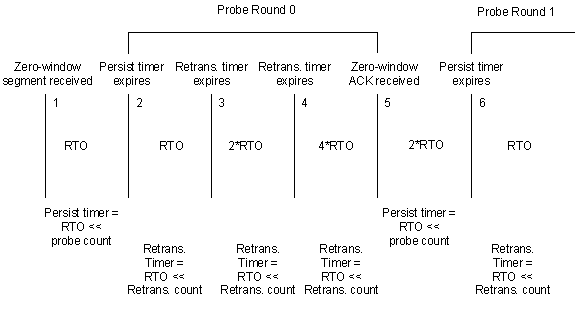Persist Timer
[The TCP chimney offload feature is deprecated and should not be used.]
When the window that is advertised by the remote TCP peer on an offloaded TCP connection is greater than 0 (that is, when the value of the SndWnd member of the TCP_OFFLOAD_STATE_DELEGATED structure in the TCP delegated state for the connection is not 0), the offload target does not need to use the persist timer for the connection. In this situation, an offload target uses the values of the retransmit Count and TimeoutDelta in the connection's TCP delegated state for keepalive processing. (For more information about keepalive processing, see Keepalive Timer.) However, when the window size that is advertised by the remote TCP peer goes to 0 (which causes the value of SndWnd to go to 0), the values of the retransmit Count and TimeoutDelta, plus the value of SndWndProbeCount in the connection's TCP delegated state, represent the state of the persist timer for the connection. In this situation:
The value of SndWndProbeCount is the current round of probing.
The retransmit value of Count is the number of times that the offload target has retransmitted the window probe.
The value of TimeoutDelta is the number of ticks that remain until the persist timer expires.
The following figure illustrates the persist timer algorithm:

An offload target receives a zero-window segment from the remote TCP peer on a connection, causing the offload target to start the persist timer for that connection. Specifically, the offload target:
- Sets the value of SndWndProbeCount to 0.
- Sets the retransmit value of Count to 0.
- Starts the persist timer with a value of retransmission timeout (RTO) << SndWndProbeCount, which is equal to RTO.
If the persist timer expires before the offload target receives an acknowledgement from the remote TCP peer, the offload target:
- Sends a window probe to the remote TCP peer. (This action starts the first round of probing.)
- Starts the retransmit timer with a value of RTO << retransmit Count, which equals 1 ×RTO. (The value of the retransmit Count is 0.)
- Increments the value of the retransmit Count by 1.
If the retransmit timer expires before the offload target receives an acknowledgement from the remote TCP peer, the offload target:
- Sends a window probe to the remote TCP peer.
- Starts the retransmit timer with a value of RTO << retransmit Count, which equals 2 ×RTO. (The value of the retransmit Count is 1.)
- Increments the value of the retransmit Count by 1.
If the retransmit timer expires before the offload target receives an acknowledgement from the remote TCP peer, the offload target:
- Sends a window probe to the remote TCP peer.
- Starts the retransmit timer with a value of RTO << retransmit Count, which equals 4 ×RTO. (The value of the retransmit Count is 2.)
- Increments the value of the retransmit Count by 1.
If the offload target receives a zero-window acknowledgment before the persist timer expires, the next round of probing (round 1) starts. The offload target:
- Increments the value of SndWndProbeCount by 1.
- Sets the value of the retransmit Count to 0.
- Starts the persist timer with a value of RTO << SndWndProbeCount, which equals 2 ×RTO.
If the persist timer expires before the offload target receives an acknowledgement from the remote TCP peer, the offload target:
- Sends a window probe to the remote TCP peer.
- Starts the retransmit timer with a value of RTO << retransmit Count, which equals RTO.
- Increments the value of the retransmit Count by 1.
The algorithm continues.
If, at any point during the algorithm, the offload target receives a nonzero window acknowledgment from the remote TCP peer, the offload target exits the algorithm and resumes sending data to the remote peer.
If the number of probe counts that are sent by the offload target during a probing round exceeds TcpMaximumRetransmissions for the connection, the offload target should call the NdisTcpOffloadEventHandler function with the EventType parameter set to TcpIndicateRetrieve and the EventSpecificInformation parameter set to TimeoutExpiration. This call requests that the host stack terminate the offload of the connection. The host stack specified the value of the TcpMaximumRetransmissions member of the NDIS_TASK_TCP_CONNECTION_OFFLOAD structure when setting the OID_TCP_TASK_OFFLOAD OID during the offload target's initialization.
When offloading a TCP connection for which it was running a persist timer, the host stack passes the current values of SndWndProbeCount, the retransmit Count, and the retransmit TimeoutDelta for the connection to the offload target. The offload uses these values to resume persist timer processing on the offloaded connection. If the host stack target was not running the persist timer, it supplies a value of -1 in the TimeoutDelta member.
If the offload of the TCP connection is terminated before persist timer processing has finished, the offload target must return the current values of SndWndProbeCount, the retransmit Count, and the retransmit TimeoutDelta to the host stack during the terminate operation. The host stack uses these values to resume persist timer processing. If the offload target was not running the persist timer, it should supply a value of -1 in the TimeoutDelta member. If the offload target supplies a value of 0 in the TimeoutDelta member, the host stack assumes that the persist timer was running, and the host stack's retransmit timer expires immediately.